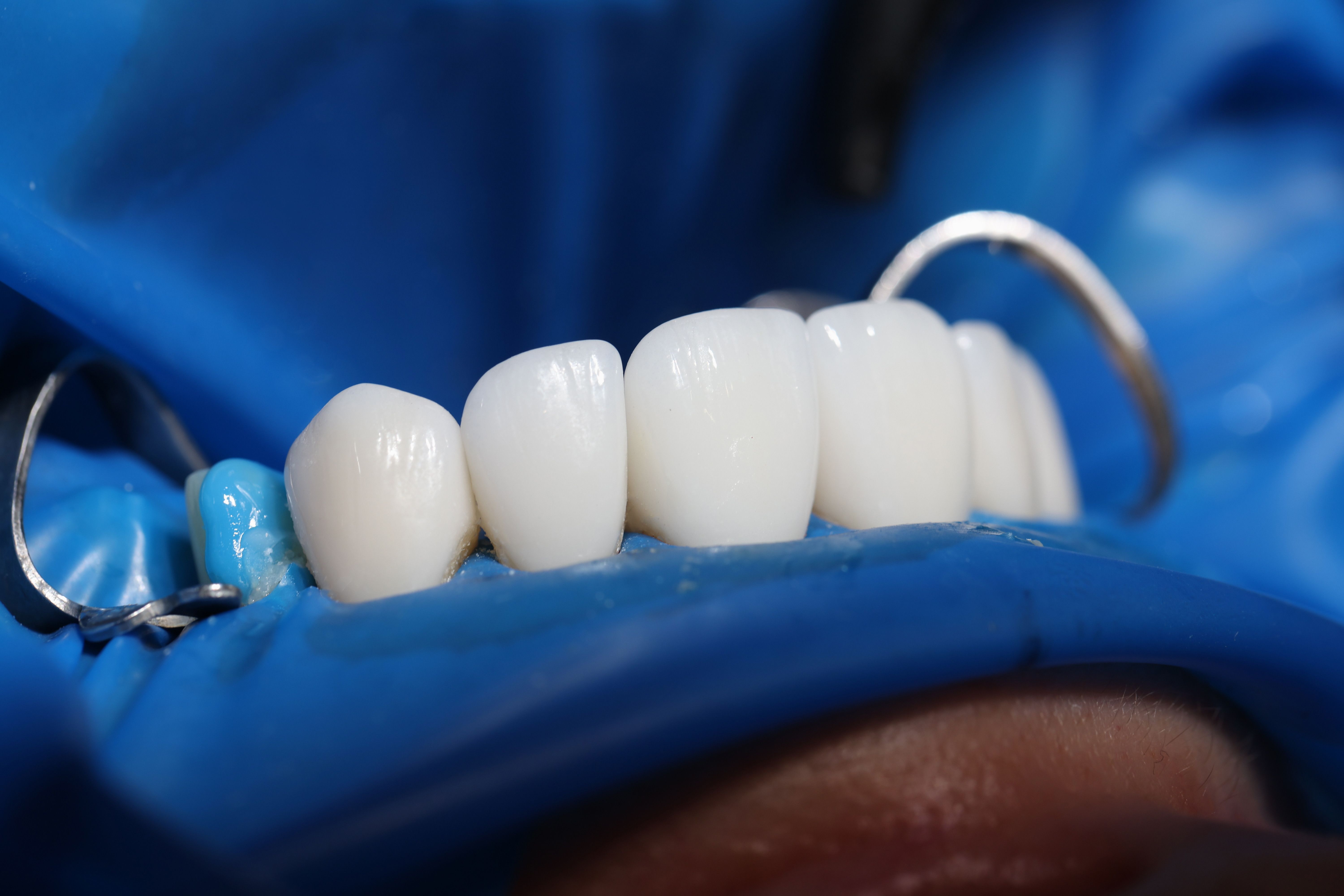If you want to intensify the appearance of your teeth and achieve a beautiful, confident smile, porcelain veneers offer the excellent solution you've been seeking. Dental professionals design these ultra-thin, custom-made shells to fit over natural teeth, providing an attractive and long-lasting alternative to traditional dental procedures. But how do you know if you're a good candidate for porcelain veneers? Whether you're looking to correct tooth discoloration, chipped or misshapen teeth, or other cosmetic concerns, discover if porcelain veneers are the right choice.
"Porcelain veneers have a high success rate, with one study finding a 95% success rate after five years and a 93% success rate after ten years".
What are Porcelain Veneers?
Porcelain veneers are thin, custom-made shells made of a durable and stain-resistant material that closely resembles the color and texture of natural teeth. Veneers address many cosmetic dental issues, including tooth discoloration, gaps between teeth, chipped or misshapen teeth, and minor alignment issues.
One of the primary benefits of porcelain veneers is that they provide a long-lasting solution to many cosmetic dental issues. Proper care can last many years, requiring no special maintenance beyond regular brushing and flossing. Additionally, veneers are an effective and minimally invasive alternative to more extensive dental procedures, such as braces or dental implants.
Which Dental Issues Are Addressed by Porcelain Veneers?
Porcelain veneers are versatile cosmetic dental treatments that can address various dental issues. Some of these include the following:
- Tooth discoloration: Teeth can become discolored or stained due to various factors, including aging, smoking, certain medications, and consuming dark-colored foods and beverages. Porcelain veneers cover up stained or discolored teeth, giving you a brighter, more youthful smile.
- Chipped or broken teeth: Accidents, injuries, or even biting down on complex objects can cause chips or cracks in your teeth. Porcelain veneers can cover up these imperfections and restore the natural look of your teeth.

- Misshapen teeth: Teeth that are irregularly shaped or sized can detract from your smile. Porcelain veneers help reshape and resize teeth, providing a more uniform appearance.
- Gaps between teeth: Large gaps or spaces between teeth can be unsightly and increase gum disease risk. Porcelain veneers help close gaps and create a more aesthetically pleasing smile.
- Minor alignment issues: While porcelain veneers are not a substitute for braces, they help correct minor alignment issues, such as slightly crooked teeth.
Types and Benefits
Each type of porcelain veneer offers unique benefits, depending on your dental needs.
Type 1: Traditional Porcelain Veneers
Traditional porcelain veneers are made from a thin layer of custom-crafted porcelain to fit over your teeth' front surface. These veneers require minimal tooth preparation, which involves removing a thin enamel layer to create space for the dental veneer. The benefits of traditional porcelain veneers include:
- Natural appearance: Traditional porcelain veneers match your teeth' natural color and texture, providing a seamless and natural-looking smile.
- Durability: Porcelain is a robust and durable material that can withstand normal wear and tear and last many years with proper care.
- Versatility: Traditional porcelain veneers address various cosmetic dental issues, including chipped or misshapen teeth, gaps between teeth, and discoloration.
Type 2: No-Prep Porcelain Veneers
No-prep porcelain veneers are a newer type of veneer that requires little or no tooth preparation. These veneers are thinner than traditional porcelain veneers and are bonded directly to the front surface of your teeth. The benefits of no-prep porcelain veneers include the following:
- Minimal tooth preparation: Because no-prep veneers require little or no tooth preparation, they are a less invasive option for those who want to elevate the look of their teeth without undergoing extensive dental work.
- Convenience: No-prep veneers can often be applied in a single dental visit, making them a convenient option for those with busy schedules.
- Reversibility: No-prep veneers require minimal tooth preparation, so they can be removed with minimal damage to your natural teeth if desired.
Traditional and no-prep porcelain veneers offer unique benefits depending on your dental needs and goals. It's imperative to discuss porcelain options with your dentist to determine the type of veneer best suits you.

What Happens During a Porcelain Veneers Procedure?
A porcelain veneer procedure typically involves several steps, including:
- Consultation: During your initial consultation, your dentist will evaluate your dental health and discuss your goals for treatment. They may take x-rays or impressions of your teeth to help plan the procedure.
- Tooth preparation: To apply porcelain veneers, a thin layer of the enamel must be removed from the surface of your teeth. It helps ensure a proper fit and allows the dental veneers to bond securely to your teeth.
- Impressions: Your dentist will take impressions of your teeth to create custom-made veneers. The dental lab will get the dental impressions of your teeth to make dental veneers.
- Temporary veneers: Your dentist may place temporary veneers to protect your teeth until putting the permanent ones.
- Veneer placement: Once your permanent veneers are ready, your dentist will carefully place them on them to ensure a comfortable and natural fit. The dental veneers are then permanently bonded to your teeth using special dental cement.
- Follow-up: After placing your porcelain veneers, your dentist may schedule a follow-up appointment to ensure that they are functioning correctly and that you are happy with the results.
Overall, a porcelain veneer procedure typically involves careful planning and preparation to ensure the veneers have a natural-looking result. Your dentist will work with you throughout the process to ensure your comfort and satisfaction with the outcome.
Who is a Candidate for Porcelain Veneers?
Porcelain veneers can be an excellent option for many people who want to improve the appearance of their teeth. However, only some are good candidates for this cosmetic dental procedure. Here are some factors that can make you a good candidate for porcelain veneers:
- Good oral health
Before getting porcelain veneers, it's essential to have good oral health, including healthy gums and teeth free of decay or infection. Before placing veneers, your dentist will address any underlying dental issues, such as gum disease or tooth decay.
- Cosmetic dental concerns
Porcelain veneers address cosmetic dental concerns, such as discolored, chipped, or misshapen teeth. You are generally a good candidate for veneers if you have one or more such issues.
- Sufficient tooth enamel
To apply porcelain veneers, a thin layer of the enamel must be removed from the surface of your teeth. Porcelain veneers are not for you if you have lost significant enamel due to tooth decay or grinding.
- Commitment to dental hygiene
Porcelain veneers require regular brushing and flossing to maintain oral health and prevent staining. You may be a good candidate if you are committed to good dental hygiene and are willing to take proper care of your veneers.
- Realistic expectations
It's essential to have realistic expectations about the results of porcelain veneers. While they can significantly improve the appearance of your teeth, they are not a substitute for proper dental care or a solution for underlying dental problems.
Concluding Thoughts
Porcelain veneers are a popular and effective cosmetic dental option for people who want to improve the appearance of their teeth. Veneers can address various cosmetic dental concerns, such as discoloration, chipped or misshapen teeth, and gaps between teeth.
Porcelain veneers look and feel like natural teeth and can provide a long-lasting cosmetic improvement to your smile. However, it's important to note that veneers are not a substitute for proper dental care, and some may have better options.
Before getting porcelain veneers, it's essential to consult a qualified dental health professional to determine if you qualify for the procedure.
Contact your Pinole dentist, Azadeh Hosseini, DDS, or Ghazal Hosseini, DDS, at Top Pinole Dental to learn about the Porcelain Veneers and Who Is a Good Candidate.
Resource:
The Benefits of Dental Veneers
This media/content or any other on this website does not prescribe, recommend, or prevent any treatment or procedure. Therefore, we highly recommend that you get the advice of a qualified dentist or other medical practitioners regarding your specific dental condition.
1500 Tara Hills Dr., Suite 104A, Pinole, CA 94564
Monday – Saturday 8:00 AM to 5:00 PM
